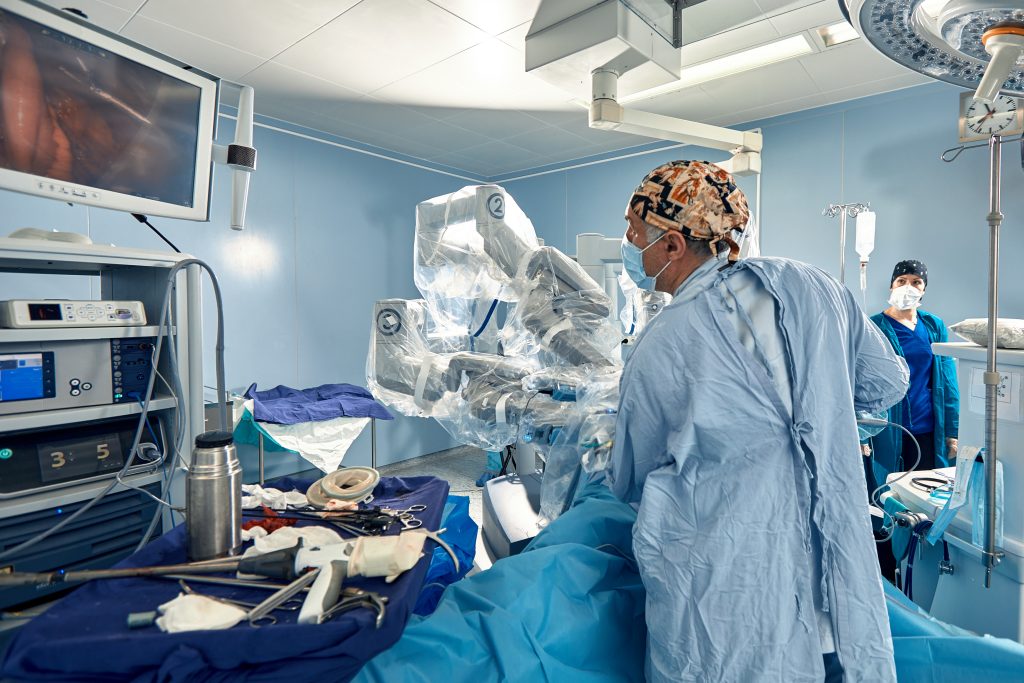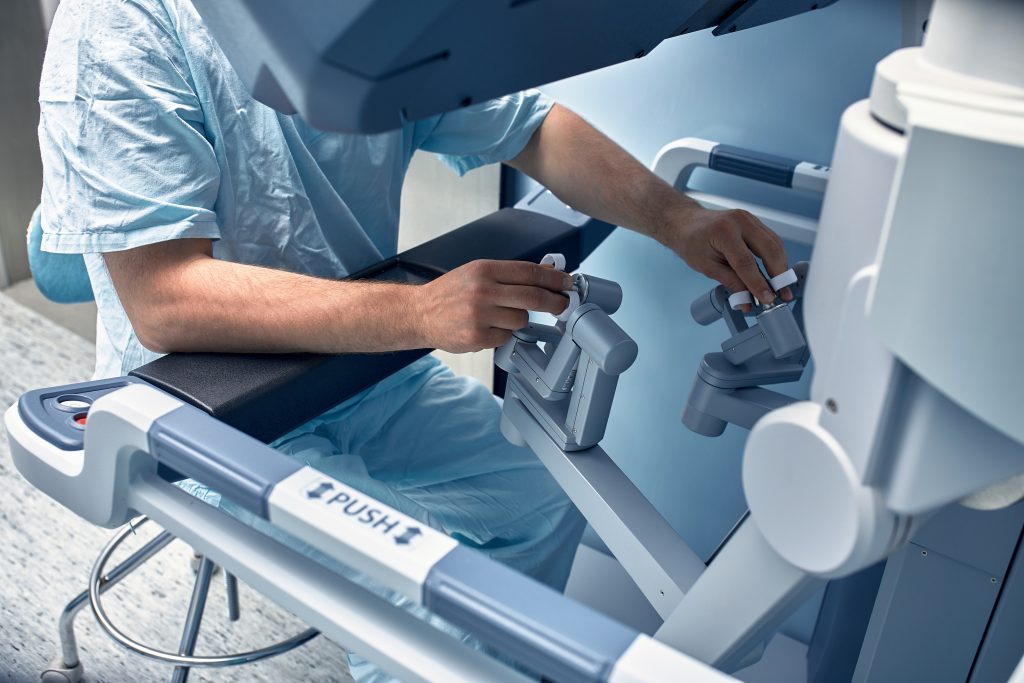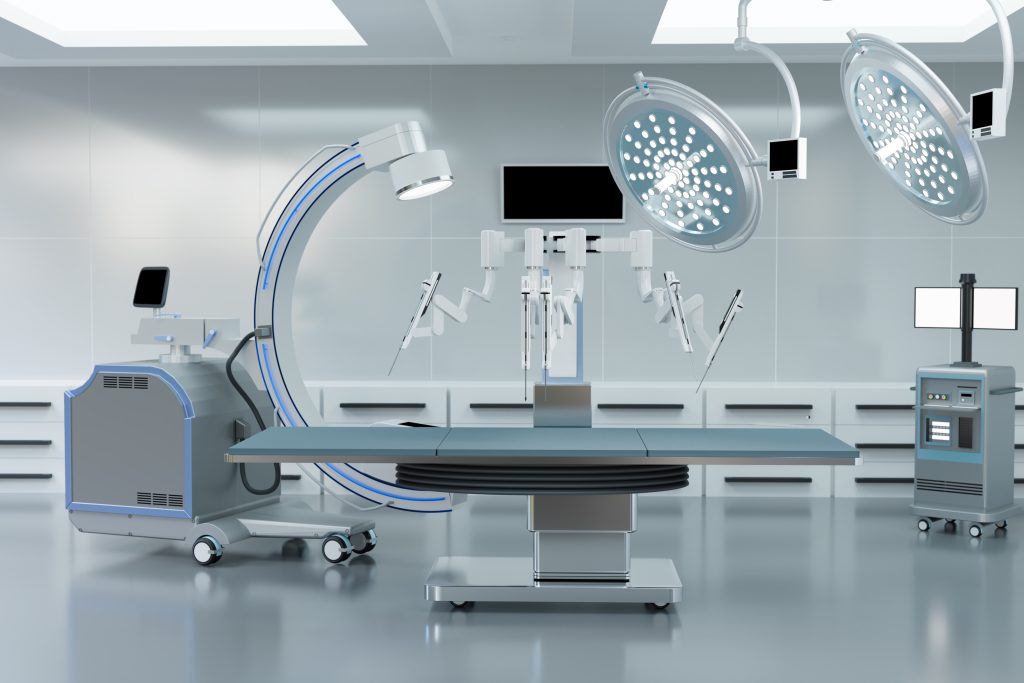Transoral Robotic Surgery (TORS)
Sophisticated technology is utilized in transoral robotic surgery (TORS) to reach challenging areas at the rear of the throat. If you have throat cancer, you may qualify for TORS as a potential treatment option. Additionally, TORS can also be employed for the management of obstructive sleep apnea and lingual tonsillitis.

Patient Benefits with TORS
Transoral robotic surgery provides patients with notable advantages, such as improved visibility, mobility, and precision for the surgeon, during the procedure.
- Less post-operative discomfort
- The length of time spent in the hospital is shorter for minimally invasive surgery (1-2 days) compared to traditional open surgery (7-15 days).
- There are no visible marks or scars because no cuts were made on the outside.
- Speedier recovery
- Speaking and swallowing abilities can recover at a quicker rate, potentially even as soon as the day after the surgery.
- minimizing potential problems that may arise (such as difficulties with swallowing or speaking)
- Decreasing the necessity of chemotherapy or radiation therapy, specifically for cancers detected in the early stages.
- Cost efficiency refers to the reduction of various factors such as operating room time, required staff, the use of materials, and the duration of hospital stay. These reductions lead to financial savings for the hospital and ultimately benefit each individual patient.
What is TORS used to treat?
The incidence of throat cancer has risen by about 30% over the last 25 years. This increase is largely associated with specific types of the human papillomavirus (HPV). HPV can also lead to the development of skin or genital warts, with different strains causing anal and cervical cancers.
The infection is usually without symptoms until a tumor develops. Occasionally, a person with HPV may have a cancerous lump in their neck that is not easily identifiable as the primary site. Even after undergoing assessments and various imaging tests by specialists in head and neck conditions, this can still occur.

TORS is used by surgeons to treat:
- tonsil and tongue cancer
- salivary gland tumours
- the cancer that has spread to the retropharyngeal area from the thyroid and melanoma that is malignant.
- refers to instances of throat cancer that reappear after undergoing treatment involving both chemotherapy and radiotherapy.
TORS has been utilized in cases where the original cancer of the patient is not known to determine its origin.
Experts in TransOral Robotic Surgery (TORS) have successfully utilized robotic technology to successfully remove a tumor located in the orbital area without causing any damage to the patient’s eye or their ability to see. If conventional surgical methods were employed, it would have negatively affected the patient’s vision.
Preparation for Transoral Robotic Surgery
Our team will provide instructions on how to get ready for your surgical procedure. Some of the topics we will cover during the discussion are:
- Please provide the scheduled time of your surgery and the recommended arrival time.
- In case you require any extra tests prior to your surgery,
- How much earlier should you stop eating or drinking before the surgery?
- Should you take any medications that you typically consume prior to a surgical procedure?
- What clothing and belongings you should have when going to the hospital.
While the patient is in a state of unconsciousness due to general anesthesia, the surgeon manipulates the robot’s movements using their hands and feet.
What happens during the surgery?

A 3D camera is held by one of the robotic arms, while the other two arms hold small instruments that are inserted through the mouth into the throat, vocal cords, or upper part of the esophagus.
The surgeon is positioned at a control panel in the operating room, where they have a highly immersive, enlarged, and three-dimensional perspective of the specific area they are working on. They are able to manipulate the surgical instruments in ways that would be impossible using only their bare hands.
This enables the surgeon to focus on the tumor and eliminate it with greater accuracy, potentially decreasing the required radiotherapy. In certain cases, it even eliminates the necessity for chemotherapy and radiotherapy entirely.
Is TORS the only procedure I’ll need?
The specific type of treatment you receive for cancer relies on your diagnosis. Additionally, cancer treatment might encompass:
- Restorative surgery, also known as reconstructive surgery, aims to improve the aesthetic or functional aspects of your mouth. This procedure may include repairing the tongue or throat, enabling you to regain the ability to speak and swallow post-surgery.
- In cases where cancer has spread, surgeons perform a neck dissection by removing the lymph nodes located in the neck. Since these small nodes are frequently the initial site of cancer spread, doctors make an incision in the neck to eliminate the lymph nodes that are most susceptible to being affected by the disease.
What to Expect After Transoral Robotic Surgery
Following your surgery, it is likely that you will stay in the hospital for a period of one to two days. Our team will carefully observe your condition and ensure that your pain is managed effectively. Once you are discharged, you will be provided with guidance regarding the activities you should and shouldn’t engage in, as well as the schedule for follow-up appointments. It might be beneficial to have someone accompany you during your recovery phase in your home.
If you require more treatments such as chemotherapy or radiation, your doctor will talk to you about it. In the case that your cancer was completely eliminated through surgery, your doctor will discuss a plan for continued monitoring. Even if the cancer is completely removed, most patients will still need to have regular appointments with their doctor for approximately two years.
Treatment in Türkiye:
The medical staff of surgical teams, doctors, and consultants at REHABTÜRK can provide the best treatment options and free consultations, striving to stay up-to-date on the latest medical technologies and methods.
